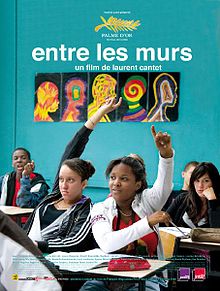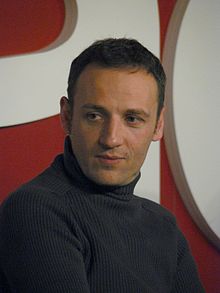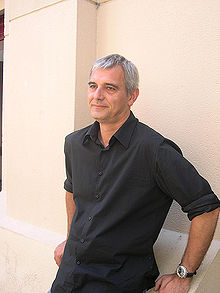 Since this movie is the movie adaptation of Paris middle school teacher François Bégaudeau’s book Entre les murs (“within the classroom”) which he wrote based on his own experience, François Bégaudeau also wrote the screenplay and performed as himself in the movie. In addition to his main job as a teacher, his careers include being a rock musician, writer, and rock music critic; after winning a César Award as a scriptwriter, being awarded the Palme d’Or at the Cannes Film Festival, and being nominated for an Academy Award, he has added to his resume a career in the movie industry. After his book became popular, he resigned as a teacher and now seems to be doing writing and movie-related work.
Since this movie is the movie adaptation of Paris middle school teacher François Bégaudeau’s book Entre les murs (“within the classroom”) which he wrote based on his own experience, François Bégaudeau also wrote the screenplay and performed as himself in the movie. In addition to his main job as a teacher, his careers include being a rock musician, writer, and rock music critic; after winning a César Award as a scriptwriter, being awarded the Palme d’Or at the Cannes Film Festival, and being nominated for an Academy Award, he has added to his resume a career in the movie industry. After his book became popular, he resigned as a teacher and now seems to be doing writing and movie-related work.
Many different races are mixed in this middle school class that is in the 20th district of Paris where immigrants from a variety of areas coexist. This movie mainly depicts the events that occur over the course of one year within François’s class. François is a French teacher that teaches authentic French to students who mostly don’t speak French as their native language. In terms of the French ability of the children, they have no problem with daily conversation, but their verb conjugation is incorrect and they do not sufficiently understand abstract vocabulary or subjunctive mood that is mainly used in writing. Many of the students are black children of immigrants, but their homelands vary—Mali and Morocco in Africa, the Caribbean, etc.—so their cultural backgrounds are diverse; we can’t simply say “immigrant children” or “black immigrant”. Small fights between these children frequently happen.
This movie received the highest accolades at distinguished film festivals and, as a movie about a school with teacher-student relations, I expected a poignant drama of an enthusiastic schoolteacher, but it was actually different when I watched it. This movie does not discuss an ideal education, does not praise either the teacher or the students, and is not a social issue drama depicting the children of immigrants. If entering with such expectations, you will leave with them unfulfilled. Various problems happen one after another and François works hard to respond to them, but he isn’t necessarily able to solve the problems well. This movie simply depicts various incidents—many arguments and conversations between students and the teacher, parents and the teacher, and among teachers—and then the school year just ends. So then some may wonder, what is good about this movie?
 First, why did François Bégaudeau write his original Entre les murs? It is because of the inconsolable present conditions of his career as a teacher. A job is needed in order for anyone to survive, so he became a teacher. Since his parents were also teachers, teaching was a familiar occupation. However, a teacher in France is not very well paid, is not thanked by students and parents even when working very hard, and every day is spent responding to students who constantly talk back. He likes his students and seems to have enthusiasm for his job, but nevertheless, if I borrow his words, teaching is “the saddest occupation.” Being a middle school teacher is enormously hard work. Nobody looks down on a teacher (I hope), and everyone thinks that someone must work as a middle school teacher. However, there may not be many people who are willing to be a middle school teacher. It is a problem that, even though people recognize it is an important job, only a few people are excitedly applying for these jobs.
First, why did François Bégaudeau write his original Entre les murs? It is because of the inconsolable present conditions of his career as a teacher. A job is needed in order for anyone to survive, so he became a teacher. Since his parents were also teachers, teaching was a familiar occupation. However, a teacher in France is not very well paid, is not thanked by students and parents even when working very hard, and every day is spent responding to students who constantly talk back. He likes his students and seems to have enthusiasm for his job, but nevertheless, if I borrow his words, teaching is “the saddest occupation.” Being a middle school teacher is enormously hard work. Nobody looks down on a teacher (I hope), and everyone thinks that someone must work as a middle school teacher. However, there may not be many people who are willing to be a middle school teacher. It is a problem that, even though people recognize it is an important job, only a few people are excitedly applying for these jobs.
 Then why did director Laurent Cantet want to make this book into a movie? Like François Bégaudeau, Laurent Cantet’s parents were also teachers. He had direct knowledge about school teachers and he recognized that education had a significant role in preparing a child for the real world; but he was also aware that, if the education system did not function well, many students fell through the system. For Laurent Cantet who thought about the present condition of education theoretically, François Bégaudeau’s book that concretely conveyed the viewpoint of children and the life of the classroom stimulated his creative mind and I think this was his main motive for making this movie about education. Laurent Cantet’s theme is probably something like, “Education should give children opportunities, but has it become a place that instead narrows the opportunities for children?” For example, a male student who accidentally injures a classmate is expelled for this incident since he is seen as a problem child among teachers, and a female student whose grades are suffering mutters, “I really don’t want to go to vocational school.” I am not very familiar with France’s educational system, but it seems that vocational school is a hopeless dead-end for students that are sent there because of their bad grades.
Then why did director Laurent Cantet want to make this book into a movie? Like François Bégaudeau, Laurent Cantet’s parents were also teachers. He had direct knowledge about school teachers and he recognized that education had a significant role in preparing a child for the real world; but he was also aware that, if the education system did not function well, many students fell through the system. For Laurent Cantet who thought about the present condition of education theoretically, François Bégaudeau’s book that concretely conveyed the viewpoint of children and the life of the classroom stimulated his creative mind and I think this was his main motive for making this movie about education. Laurent Cantet’s theme is probably something like, “Education should give children opportunities, but has it become a place that instead narrows the opportunities for children?” For example, a male student who accidentally injures a classmate is expelled for this incident since he is seen as a problem child among teachers, and a female student whose grades are suffering mutters, “I really don’t want to go to vocational school.” I am not very familiar with France’s educational system, but it seems that vocational school is a hopeless dead-end for students that are sent there because of their bad grades.
Finally, why did this undramatic, documentary-like, subdued production unanimously win the Palme d’Or at the Cannes Film Festival and receive overwhelming praise? This movie is not an exceptional movie, but I think it is because an important theme is depicted honestly and modestly. Any citizen watching this movie would have received some education so they are aware that education is important and that the education system is not perfect under the current conditions; but not many movies about education are made because it is not easy to make the educational problem into a dramatic movie. Occasionally, an exceptionally enthusiastic schoolteacher and their exceptional influence as a teacher may be dramatically depicted. Ordinary children and a professional teacher from poor neighborhoods in Paris were chosen from the audition to depict reality beyond the performance by actors. It was actually quite convincing.
This movie raises questions about education, and the main characters the child actors play in this movie should be problem children, but there is a hopeful twinkle in the eyes of the children appearing in this movie. Perhaps while they were involved in the making of this movie as main characters, they started to feel, “I didn’t know film making would be this fun!” or, “How joyful to become the lead role and use my own mind and heart!” Therefore, all the children playing problem children are cute. It may have been slightly unplanned by the director, but the twinkle of these children may be the reason for the refreshing feeling left after watching the movie.
